What Size Kettlebell Should I Get?
Author:
Unlock your full potential by engaging with our experts and community! Have questions about your fitness journey or looking for expert advice on weightlifting techniques? Don’t hesitate — leave a comment below and Ihor Shymechko will provide a personalized answer and insights to help you reach your goals.
Torokhtiy is reader-supported. Some links are affiliate links, and we may earn a commission at no extra cost to you. See our disclosure page for details.
What size kettlebell should I get? The following guide will reveal the best kettlebell weight for beginners and more advanced users.
We will also reveal what types of kettlebells are available and what to look for when buying a kettlebell.
Are you wondering what size kettlebell should I get? Beginners should opt for smaller kettlebells that weigh as little as 8 kg; professional athletes can opt for larger kettlebells of around 16 kg as they are better used to lifting.

Standard Kettlebell Sizes
Kettlebells come in a vast range of sizes. Chances are you won’t need to use many of them.
The following are the standard kettlebell weights:
- 8kg (17lbs)
- 12kg (26lbs)
- 16kg (35lbs)
- 24kg (53lbs)
- 32kg (70lbs)
While there are other sizes available, choosing two or three of the above sizes should suffice and enable you to complete various kettlebell exercises.
What Size Kettlebell Should I Get?
1. What Size Kettlebell for Beginners?
If this is your first time lifting a kettlebell, start with the lowest weight you can lift without causing you to strain too much.
For women, the starter kettlebell weight will likely be an 8 kg (17 lbs) kettlebell, or even lighter, with men starting at 12 kg (26 lbs).
You will use this beginner kettlebell weight until you get used to the movements. You can increase your weight as your form improves.
2. What Size Kettlebell for Men?
While men are typically stronger than females, rather than opting for the largest and heaviest kettlebell to start with, you should opt for a lighter weight to focus on your technique.
Choosing a too-heavy kettlebell will likely lead to poor form and potential injury.
I would suggest the following kettlebell weights:
- 12 kg (26 lbs) – Opt for a lighter kettlebell if you have zero or minimal weight-lifting experience.
- 16 kg (35 lbs) – Those with some weight lifting experience, or if your form has improved with a lighter weight, then choose this weight.
- 24 kg (53 lbs) – This weight is for the more advanced user and will give you a challenging workout.
As your technique improves with these lighter weights, choose even heavier kettlebells.
3. What Size Kettlebell for Women?
If you are wondering what weight kettlebell should a woman use, then the answer would be the same as a man’s. It depends on the individual.
You should opt for a lighter kettlebell to begin, as lifting one that is too heavy could lead to poor form and potential injury.
Start at the lowest weight you can manage without straining so that you can get used to the movements involved with swinging a kettlebell.
The following is my suggested kettlebell weight for women:
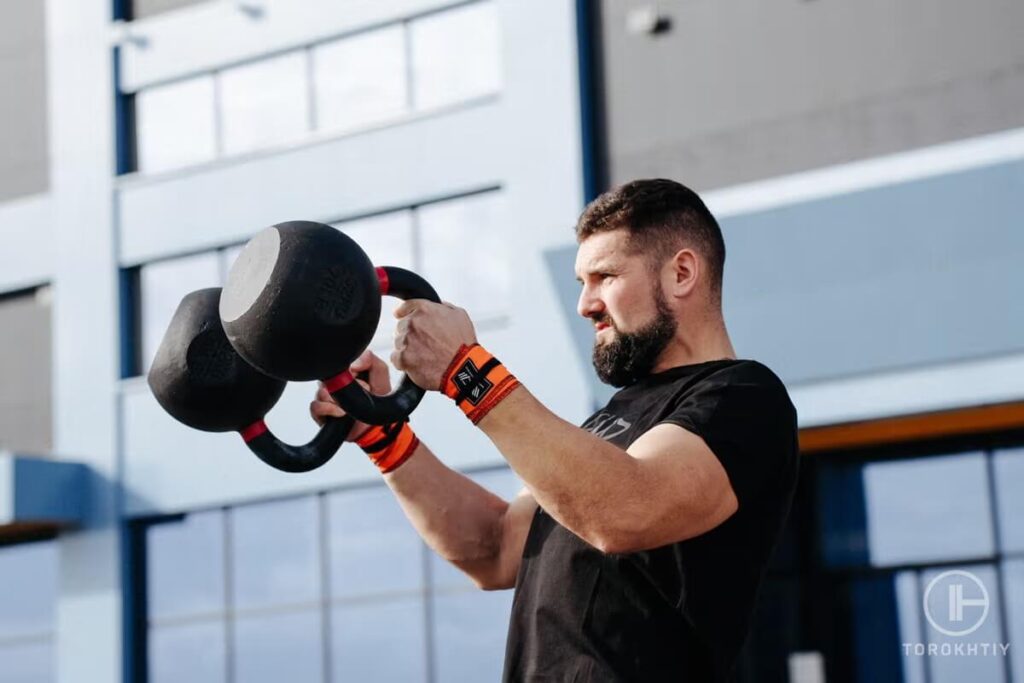
- 8 kg (17 lbs) – This would be the perfect weight for beginners so that you can learn the basic kettlebell movements.
- 12 kg (26 lbs) – As your strength increases and technique improves, you can move to a heavier kettlebell.
- 16 kg (35 lbs) – This weight should suffice for most females.
These three weights should be enough for the average woman. However, if you find the starting weight too heavy or the heavier weight too light, you can always use a different kettlebell.
4. What Size Kettlebell for Professional Athletes?
Professional athletes, such as weight lifters, for example, are used to a variety of equipment and will be better used to lifting dumbbells and barbells. This means they will find the move from these pieces of equipment to a kettlebell easier.
With this in mind, you can start at a higher weight and progress to a heavier weight faster than the average person.
The following would be our suggested kettlebell weights for professional athletes:
- 16 kg (35 lbs) – This is the ideal starting weight for athletes.
- 24 kg (53 lbs) – The middle range will be needed as your strength and technique improve.
- 32 kg (70 lbs) – Moving a kettlebell at this weight will be difficult for anyone but the most athletic.
5. What Size Kettlebell for Kids?
You may think kettlebells won’t be suitable for kids, yet your children can experience plenty of benefits when using resistance training.
If performed correctly and under supervision from a professional coach or fitness instructor, they can experience an increase in muscle and strength, fewer sports-related injuries, and an overall improvement in sports performance.
When choosing a kettlebell for your child, you should select one of the lighter ones. 5-15 lbs should suffice for those between 9 and 11 years old. Children between the ages of 12 and 16 can choose a 10-20 lbs kettlebell.
While there are benefits to be gained from using kettlebells at a young age, you still need to remember that your child is still developing, so you should always supervise them and avoid a lot of loads with ballistic kettlebell training.
6. What Size Kettlebell for Seniors?
As you get older, you must try to maintain your fitness levels; a kettlebell will help.
Regular weight training offers a range of health benefits for seniors, including less pain and stiffness from arthritis and increased strength and flexibility.
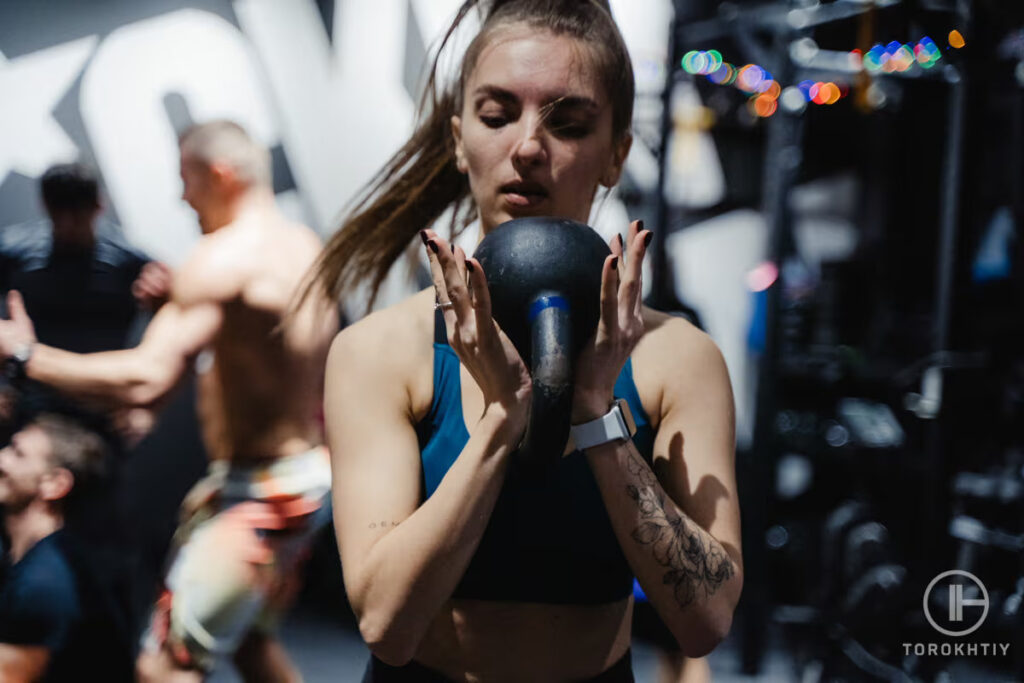
If you are a male who has already used weights, consider a heavier kettlebell, perhaps something over 12 kg (26 lbs). Females should opt for something lighter.
For those new to lifting, you can opt for lighter weights and focus on your form.
It would be best to focus on more total body compound workouts, so swings, squats, and cleans would be best. These will help with your overall fitness and help strengthen your bones.
One thing to consider if you are looking to buy a kettlebell as a senior is whether you already have fragile joints. If you have, it would be advisable to speak to your doctor or physiotherapist before starting your kettlebell training.
Materials Used for Different Kettlebell Types
1. Cast Iron Kettlebell
The cast iron kettlebell is the most popular type and will be found in most gyms.
These kettlebells are made from a single piece of metal, making them durable and excellent value for money.
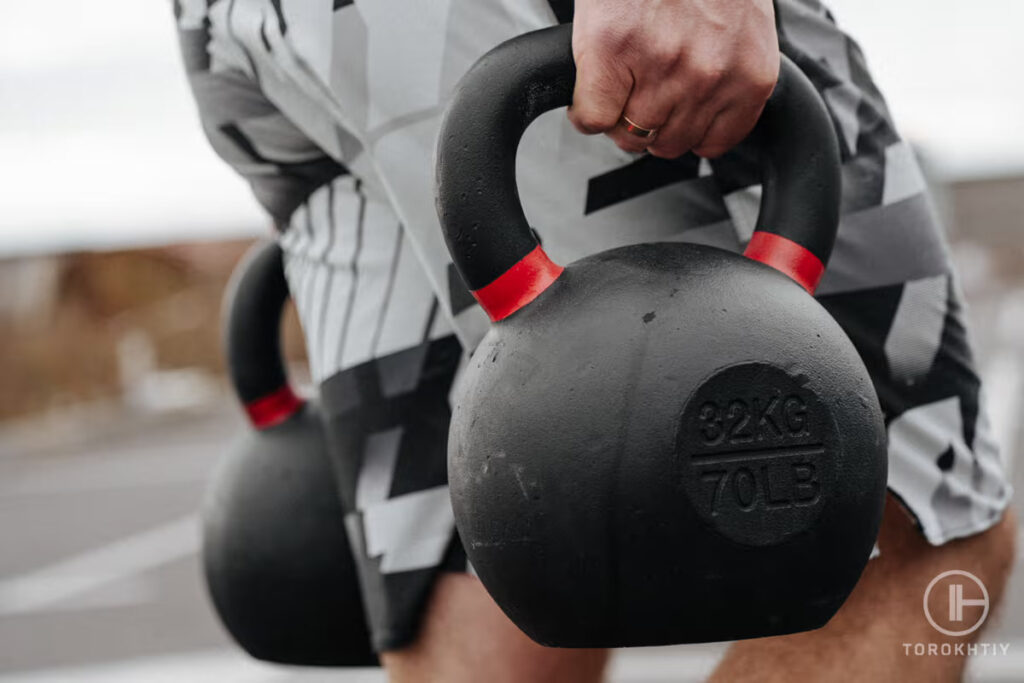
When looking at cast iron kettlebells it is worth looking to see whether they have been made from a single piece of metal. You may find cheaper brands that weld the handle to the bell’s body. This may weaken the kettlebell if care is not taken.
While affordable, these kettlebells do have one issue. As they do not have a protective layer, they may cause damage to your floors if you are not careful with them; plus, they can be noisy when used by multiple people, perhaps in a group fitness class, for example.
2. Plastic Kettlebell
Plastic kettlebells are the most cost-effective kettlebells available to buy. Due to their low cost, they are great for beginners. They have problems that stop those who take their training seriously from using them.
This variety of kettlebell can be found for sale in general stores, with low prices to entice unsuspecting buyers into buying inferior products.
Plastic kettlebells often use sand for weight, and as they are usually made using a two-piece molding, the seam can often crack, leading to the contents leaking everywhere.
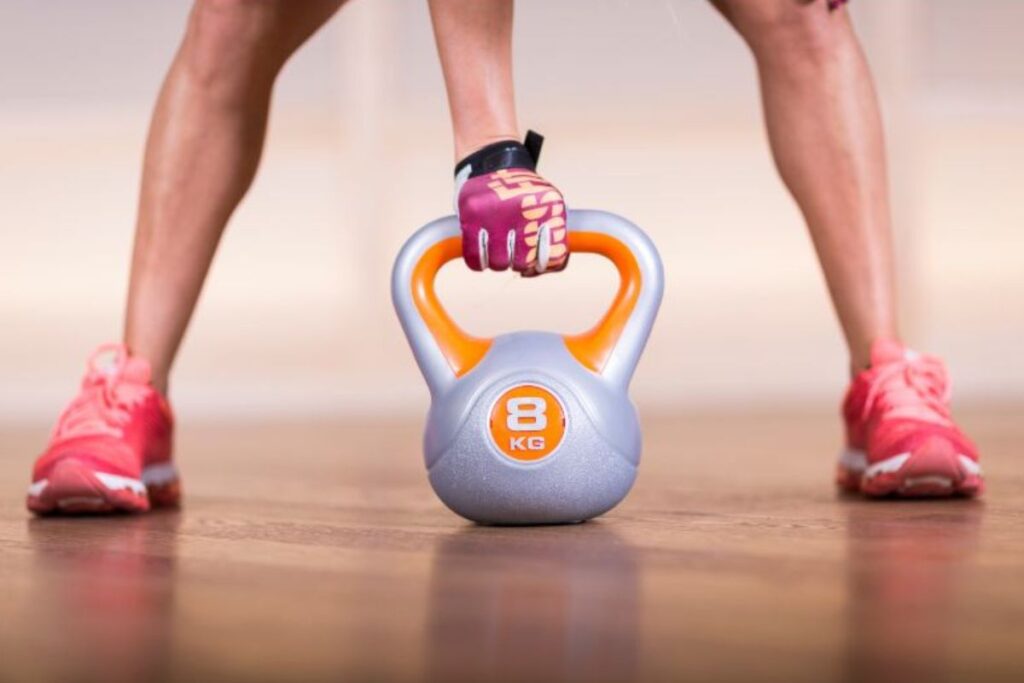
Another potential issue with plastic kettlebells is the grip. While exercising, your hands will likely become sweaty, which is an issue that we can overcome by using chalk. Unfortunately, the plastic will not hold the chalk like a cast iron kettlebell.
The final issue with plastic kettlebells is their shape. You will find that most plastic kettlebells are not perfectly circular in diameter and are more oval.
This shape can cause an issue when performing kettlebell exercises like cleans or snatches. Any exercise that involves moving from one grip to another will cause problems with the imperfect shape likely to get caught and potentially damage the skin of your hand.
3. Rubber/Nylon Coated Kettlebells
If you are looking for a kettlebell that won’t cause damage to your floor, then a rubber kettlebell would be a good option.
They are coated with polyurethane, rubber, vinyl, or nylon, providing a protective layer to your kettlebell, and helping to prevent scuffs from occurring on your floors, walls, and other equipment.
These kettlebells come in a range of colors that are used to help distinguish between the various kettlebell sizes available. Plus, these colors can help bring a little interest to an otherwise drab gym.
The one issue commonly noted with this variety of kettlebell is the smooth chrome handle used. While this helps sanitize the bell easily, it makes it difficult to grip when performing more challenging exercises.
4. Competition Kettlebells
Our final type would be competition kettlebells, which are unique as they are the same size and shape regardless of the weight chosen. This is achieved by hollowing out any lighter kettlebells.
This variety is only found in a home gym if the user is planning on entering a kettlebell tournament.
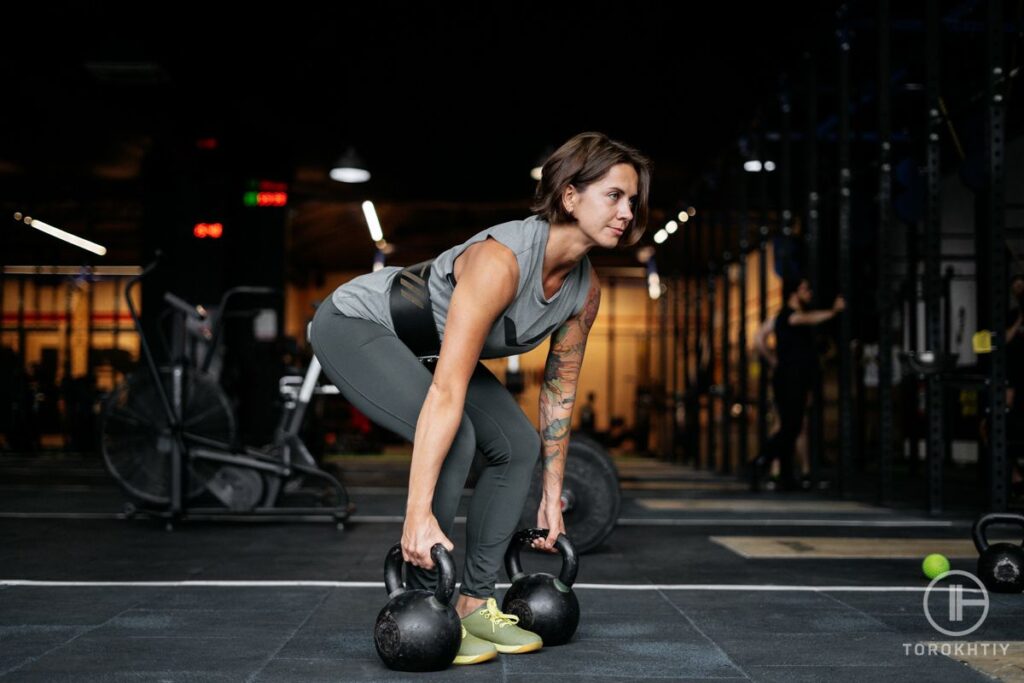
These kettlebells are all the same size and shape to ensure competitors are not able to gain a competitive edge over others, plus you won’t have to adjust your technique when increasing the weight.
This will be an excellent investment if you are an advanced user who competes regularly. Otherwise, if you are a beginner, this variety may seem intimidating.
Compared to the other kettlebell varieties listed, this variety is typically more expensive, and a set will take up considerably more room.
5. Adjustable Kettlebells
If you are short of space in your home, consider buying adjustable kettlebells.
These kettlebells are designed for the weight to be adjusted when required.
Most models consist of weight plates that can be added or removed to adjust the weight, although there are others available that are designed to use either water or sand to change the weight.
While their space-saving benefits make them popular for a home gym, adjustable kettlebells may only be suitable for some.
One potential issue is that changing the weight is sometimes a slow process and can be annoying if you have to change the weight multiple times during a workout.
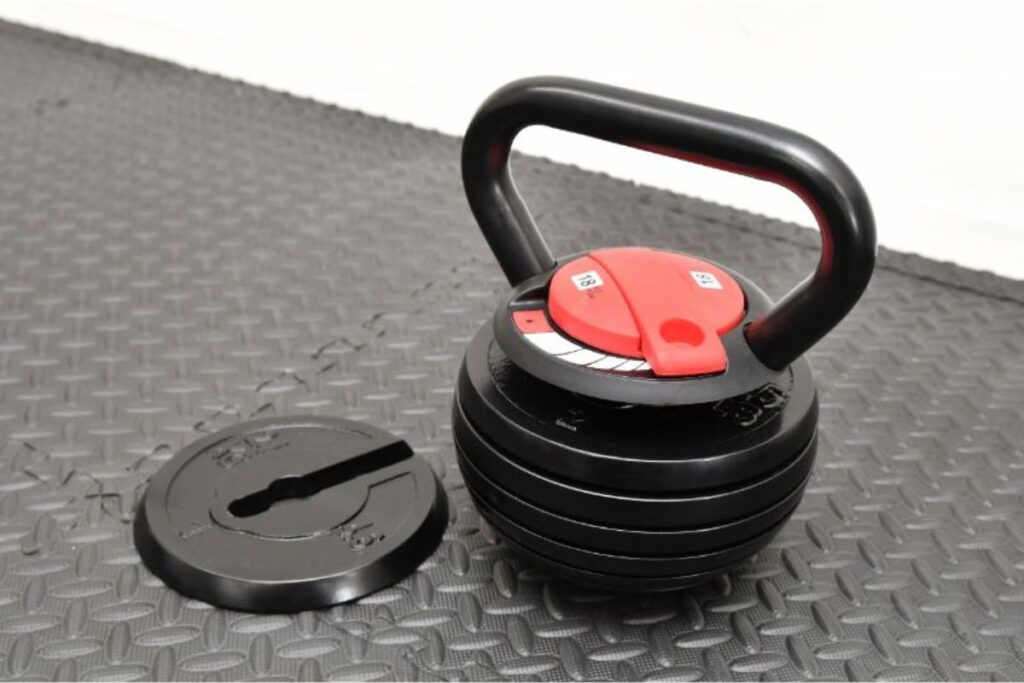
These kettlebells are also less durable than other types. This is because they use more working parts that can potentially break during repetitive use.
The final issue is the limited weight range available, with most adjustable kettlebells typically having a weight range of just ten to forty pounds.
This weight range may suit those just starting their fitness journey, but with regular training, you will quickly realize you need a higher weight.
6. Cerakote Kettlebells
If you are looking for a customized kettlebell, you may be tempted to buy a cerakote kettlebell.
Cerakote is a polymer-ceramic composite coating that can be applied to kettlebells to increase durability. This coating has been shown to resist abrasions and corrosion and improve impact strength and hardness.
This may be an option if you want a hard-wearing kettlebell that will last forever.
As this is a coating added to a kettlebell, you can choose a pre-made design or create one of your own designs.
7. 33 mm Handle Kettlebells
If you have smaller hands or poor grip, consider buying a 33 mm handle kettlebell.
They are manufactured similarly to cast iron or steel kettlebells. Still, they have a thinner handle that will be much easier to hold onto when performing high-velocity movements like one-arm swings, snatches, or cleans.
With this thinner grip, you will be less likely to lose grip and throw the kettlebell across the room.
As they are usually made from a single piece of metal, this variety of kettlebell will be incredibly durable.
Regarding cost, a 33 mm competition kettlebell will be cheaper than the 35 mm variety. This is because it is not approved for international competition, so it does not have the same level of quality or testing performed on it.
Best Kettlebell Types for Place of Use
1. Best Kettlebell Type for Home
Choosing kettlebells for your home will come down to personal choice.
The weight range will depend entirely on your strength and fitness goals. At the same time, the type of kettlebell will depend on where you will be using them.
If you plan on using the kettlebell in your living room or on a surface you don’t want to get damaged; you will need to choose a rubber or urethane-covered kettlebell.
These materials are hard-wearing but are soft enough not to damage your expensive floors.
When choosing kettlebells for your home, if your budget allows you could choose to have your kettlebells customized, or you could choose a kettlebell with a face on. There are so many options available to you!
2. Best Kettlebell Type for the Gym
When looking at kettlebells for the gym, you will want to choose durable ones. This is because gym members are known for not looking after the equipment.
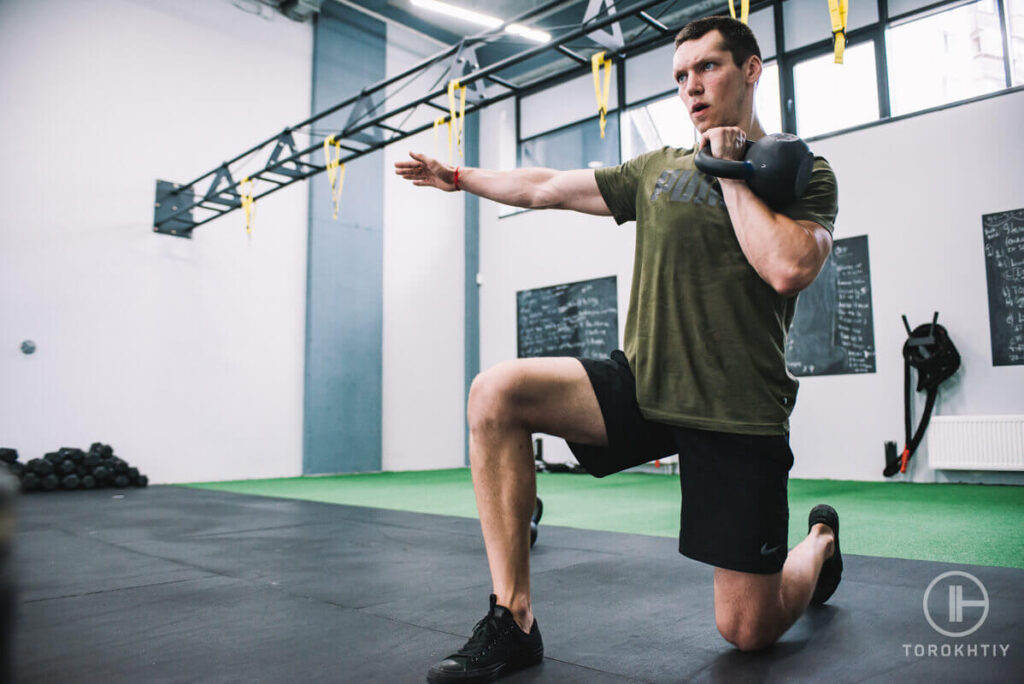
Urethane kettlebells could be a good option, as they are covered with a protective layer that makes the kettlebell incredibly strong and shock-absorbent. Ideal for protecting them from unruly gym members.
It is best to opt for a mid-weight range as this will ensure both male and female members have a good selection.
Should I Get a Kettlebell Set?
Kettlebells are versatile gym equipment that will enable you to perform various exercises. The question remains how many kettlebells do I need?
Well, the reality is that you can buy a set of kettlebells to get a good workout, especially if you are a beginner. All you have to do is increase the number of reps while learning the proper technique.
However, as your form progresses, adding a few more weights to your collection will likely be worthwhile.
Having these additional weights will allow you to perform an even wider number of exercises, plus it will enable you to continue building up your fitness levels, leading to both strength and muscle increases.
How to Choose the Best Kettlebell Size?
1. The Material of the Kettlebell
When choosing a kettlebell, one of the most important things to consider is the materials it is made from.
Most kettlebells will be made from metal, although you will find plastic ones available too that we wouldn’t recommend due to poor construction.
Consider whether you need a protective coating. If you plan on using the kettlebell anywhere you don’t want to be damaged, then opt for a rubber coating.
2. What Kettlebell Exercises You Perform
Even though the kettlebell is a versatile piece of gym equipment, you still need to consider what exercises you plan on using it for.
Kettlebell exercises are usually split into two main types:
- Lifts – These include exercises such as swings and cleans.
- Grinds – These include windmills and overhead presses.
The lift exercises will typically require a heavier weight than the grinds. Suppose you are going to do one type more than the other. In that case, you opt for either a heavier or lighter weight if you are only buying a single kettlebell or multiple kettlebells if you are planning a mixture of exercises.
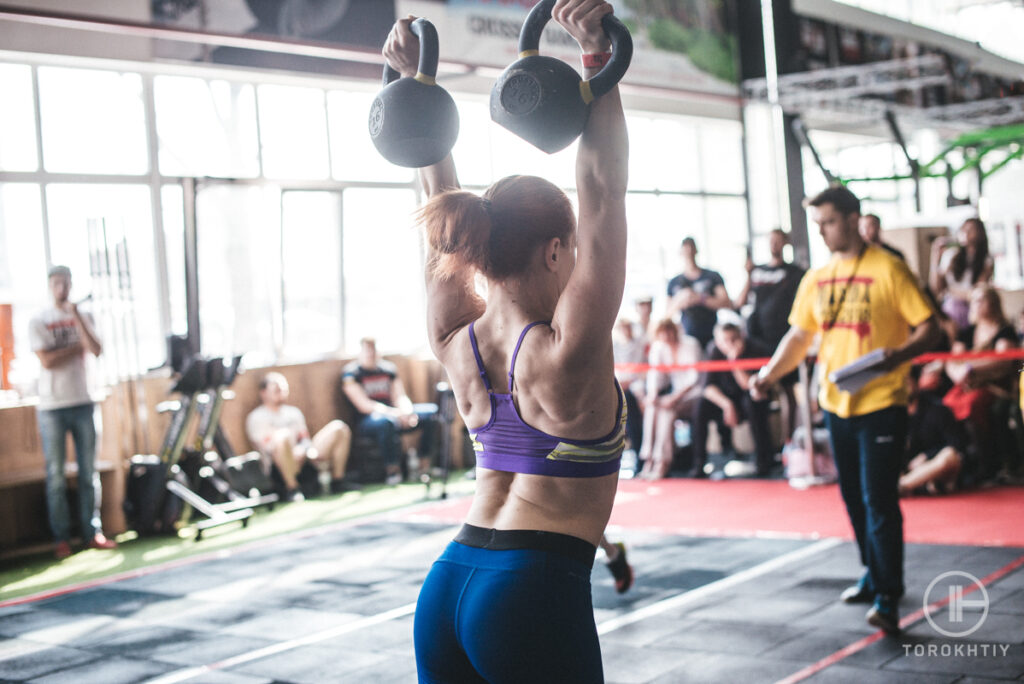
3. What Sex Are You?
Depending on your sex, you will need to look at what weight kettlebell you choose to buy.
Women will often need to start at a lighter weight than men, but if you are a beginner, it is worth opting for a lighter weight to start until you learn the proper technique for lifting.
Men are terrible for choosing weights heavier than they can lift with proper form, increasing their risk of injury.
As your technique improves then think about increasing the weight.
4. The Kettlebell Handle
To avoid injury to your hand, you must ensure the kettlebell handle is good quality.
It would be best if you avoided any handle that is too rough or has any damage. The handle should also be wide enough to hold with two hands without difficulty.
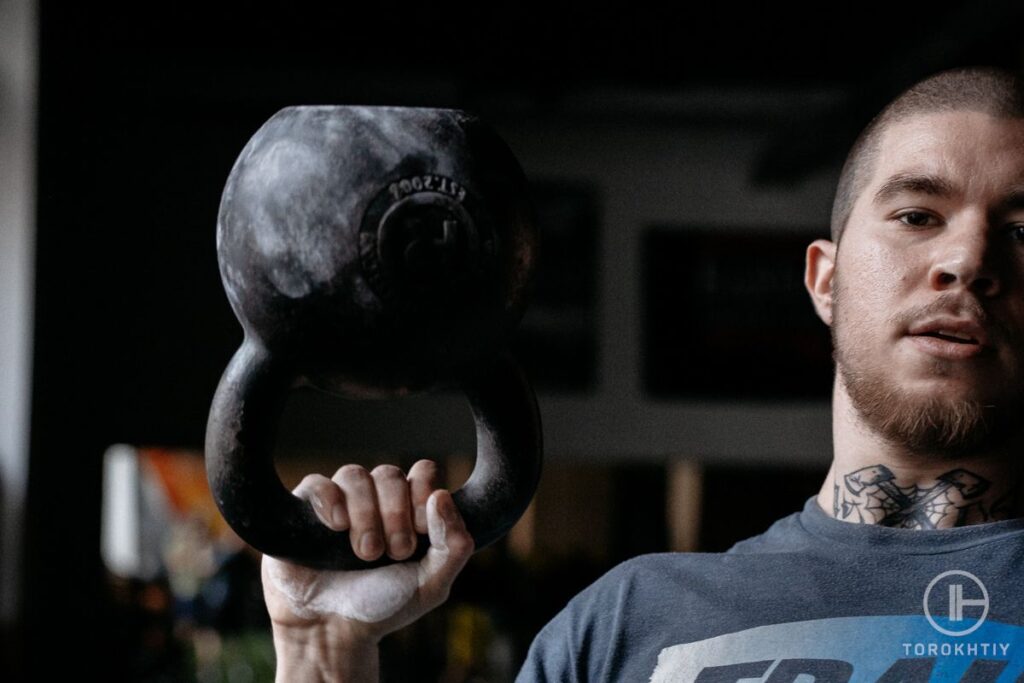
The diameter of the handle should also not be too thick to help with your grip and ensure you do not drop the kettlebell while in use.
You should probably avoid kettlebells with a handle that is too smooth, it may feel good to begin, but as you sweat, it won’t be easy to hold onto.
5. Choose a Reputable Supplier
When choosing a reputable sports gear supplier, you should look at reviews from previous buyers. Never buy a kettlebell based just on its price rate, as you will likely be disappointed with a poor-quality product.
Our favorite kettlebells are REP Fitness Matte Kettlebells. These are prime-quality kettlebells made of durable cast iron and have smooth matte finish for better durability and grip quality. No matter what your fitness level and goals are, you’ll be able to choose a fitting kettlebell size. The REP Fitness company offers kettlebells from 9 lb and up to 106 lb, which will fit both male and female athletes’ needs.
To distinguish the size of a particular kettlebell, each gear is marked with a specific color according to the international color standards. So, you won’t waste time between sets to determine what kettlebell you need to take.
FAQ
What Size Kettlebell Should I Get for Weight Loss?
When choosing a kettlebell for weight loss, you should select one slightly lighter than usual to perform HIIT workouts. This will allow you to work out with intensity, with short breaks between sets.
Is a 5 LB Kettlebell Too Light?
For most people, a 5 lb kettlebell will be too light. However, for some, this will be the ideal weight.
How Do I Know if My Kettlebell Is Too Heavy?
You will know if a kettlebell is too heavy if you cannot perform at least five kettlebell swing repetitions using two arms. To avoid potential injury, you should opt for a lighter weight.
Conclusion
If you were wondering what weight kettlebell should I get, I hope you now have some answers.
There is no best kettlebell weight. It comes down to your own needs, your fitness levels and sex, and what exercises you are looking to perform.
A beginner kettlebell weight should be low, but as your technique improves, you can move onto a heavier weight.
If you have questions about kettlebells, you can leave a message below.
Also read:
- Kettlebell Benefits
- Barbell vs Kettlebell
- Are Adjustable Kettlebells Worth It
- Kettlebell Buying Guide
- Kettlebell Core Workout
- Kettlebell Leg Workout
- Weight Bench Guide
- Kettlebell Buying Guide
References:
- Growing Stronger // CDC: https://www.cdc.gov/physicalactivity/downloads/growing_stronger.pdf
- Photos made by Torokhtiy Media Team; okadinlek, Canva; dreamnikon, Canva
Why Trust Us?
With over 20 years in Olympic weightlifting, strength training, nutrition coaching, and general fitness our team does its best to provide the audience with ultimate support and meet the needs and requirements of advanced athletes and professional lifters, as well as people who strive to open new opportunities and develop their physical capabilities with us.
By trusting the recommendations of our certified experts in coaching, nutrition, and sports training programming, as well as scientific consultants, and physiotherapists, we provide you with thorough, well-considered, and scientifically proven content. All the information given in the articles concerning workout programming, separate exercises, and athletic performance, in general, is based on verified data.
The product testing process is described in more detail here.
Author: Ihor Shymechko
Pro Olympic Weightlifter, Coach
Best Results: Snatch – 208 kg,
C&J – 240 kg
Ihor has been a professional weightlifter since 1996, boasting over two decades of competition experience. His notable achievements include clinching the European Championship in 2009 and securing a silver medal in the 105kg division at the Senior World Championships in 2011. Ihor represented his country in the 2008, 2012, and 2016 Summer Olympics. After retiring from competitive weightlifting, he transitioned to coaching, leveraging his vast experience to guide athletes who now compete on both national and international stages.



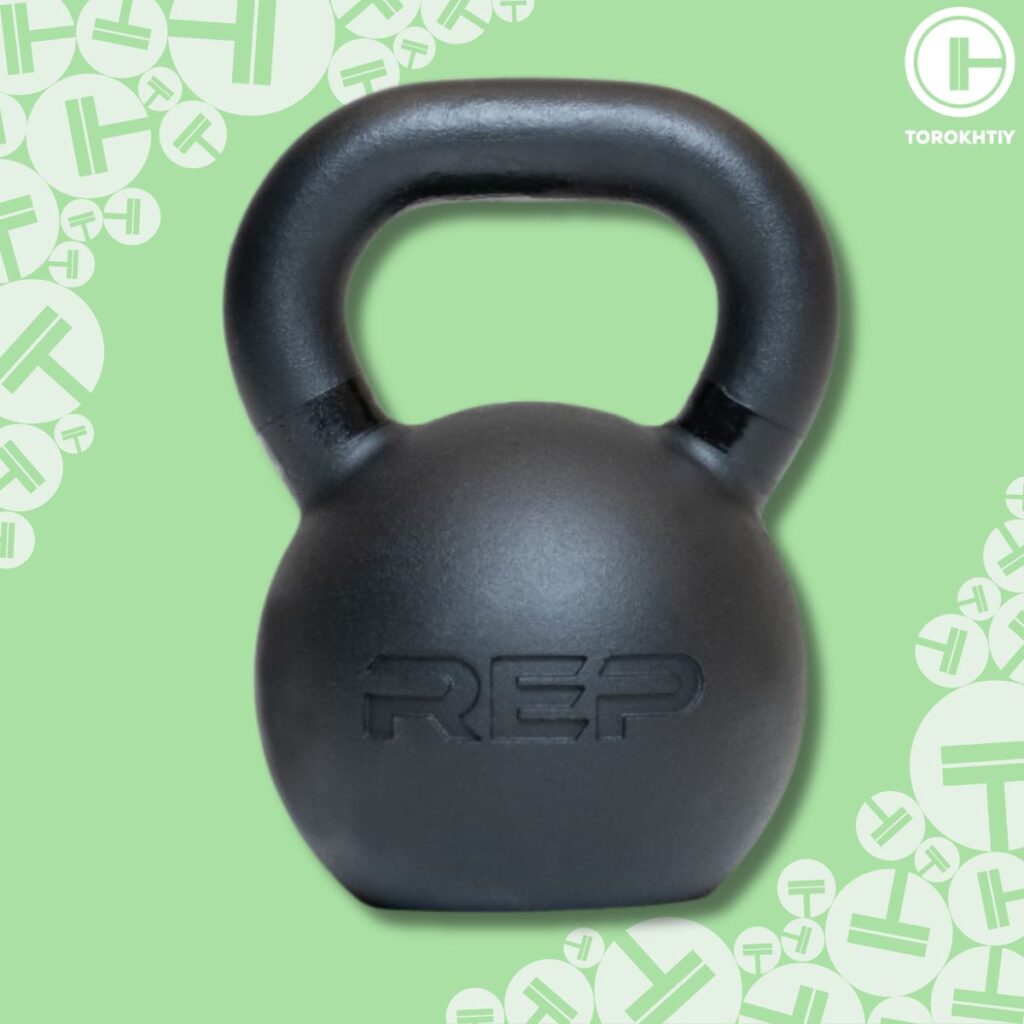
Still have questions after reading our article? Unlock your full potential by engaging with our experts and community! Don’t hesitate — leave a comment below and Ihor Shymechko will provide a personalized answer and insights to help you reach your goals.